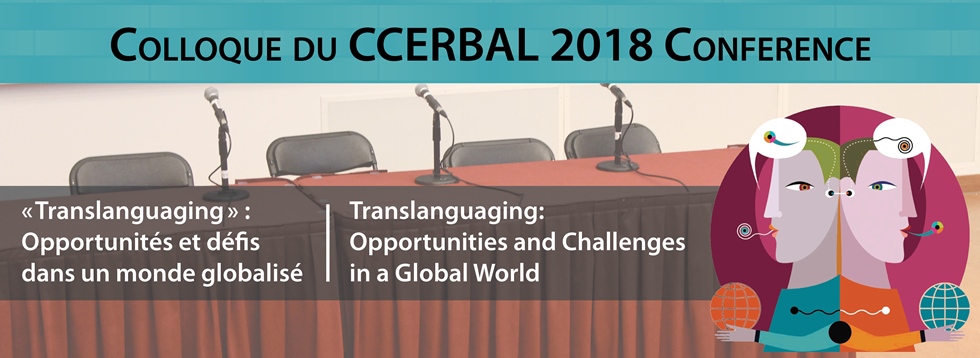
Séances spécialesTables rondes Transcending boundaries: Reflections on the use of plurilingualism, (trans)languaging, multiliteracies and related constructs (Séance bilingue) Intervenants: Enrica Piccardo (Université de Toronto), Valia Spiliotopoulos (Université Simon Fraser), Saskia Van Viegen (Université York), Diane Tedick (Université de Minnesota) Organisateur: Jérémie Séror (Université d'Ottawa) Multiple terms have emerged to try and define the key processes and concepts at the heart of the educational experience of language learners (e.g. translanguaging, multiliteracies, codemeshing, languaging, plurilingualism and multimodality, amongst others). This round-table seeks to examine some of these constructs, their origins, their underlying principles and their implications for the understanding of language learners’ practices. Invited presenters will be asked to reflect on which concepts have shaped their work and on the evolution of their thinking within the field of applied linguistics. Individual reflections will be followed by a question and answer session fostering discussion between the round-table participants and audience members about the issues raised. The round-table seeks to promote sharing of perspectives as well as a chance to discuss and ask questions about the challenge of choosing the terms we use as language researchers and educators.
The Linguistic Risk-Taking Initiative at the University of Ottawa (Séance bilingue) Intervenants: Laura Ambrosio, Manon Fleurus, Stephanie Marshall, Parvin Movassat, Margret Norenberg, Martine Rhéaume, Jennifer St-John (Université d'Ottawa) Organisateur: Nikolay Slavkov (University of Ottawa) This round table will showcase a novel initiative aimed at encouraging language learners at uOttawa to step out of their linguistic comfort zones and use their second official language (rather than their preferred language) in daily interactions on campus. We capitalize on the notion of a linguistic risk and recognize that integrating a second language in authentic communicative activities may sometimes be uncomfortable: making mistakes, being misunderstood, misunderstanding others, taking on a different identity, and changing already established language habits are a few examples of some of the “risks” involved. We view linguistic risk-taking as an important part of the learning process and of building bilingual competence and identity. To encourage learners, we designed a Linguistic Risk-Taking Passport which helps them track everyday communicative activities they have undertaken in their second language (e.g. order food at the cafeteria, speak to a professor, check out a book at the library, etc.). Students who participate in the initiative and complete a certain number of risks can also enter their passports in a draw for prizes near the end of each term. In this round table, members of the team of professors, staff and students involved in the initiative will offer pedagogical and practical reflections on the design and implementation of the passport. Les tables rondes, les symposiums et les ateliers additionnels seront inclus dans le programme officiel du Colloque. |

